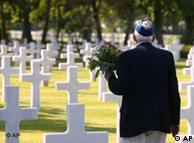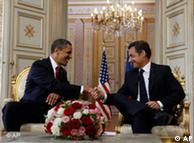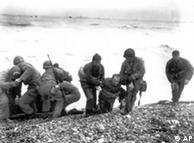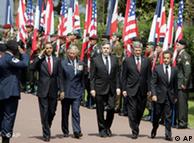World War II | 06.06.2009
World leaders pay tribute to D-Day veterans on 65th anniversary
"We will never forget the pain or the extent of the suffering and may we never renounce the dream of peace and justice for humanity," said French President Nicolas Sarkozy in his opening address to the ceremonies marking the 65th anniversary of the invasion of Nazi-occupied France by Allied forces.
 Bildunterschrift: Großansicht des Bildes mit der Bildunterschrift: More than 4000 Allied troops died in the first 24 hours of the attack
Bildunterschrift: Großansicht des Bildes mit der Bildunterschrift: More than 4000 Allied troops died in the first 24 hours of the attack
"At an hour of maximum danger, amid the bleakest of circumstances, men who thought themselves ordinary found within themselves the ability to do something extraordinary," noted US President Barack Obama.
British Prime Minister Gordon Brown also praised those who fought on that day, saying, "as long as freedom lives, their deeds will never die."
The ceremony began with the national anthems of France, Canada, the UK and the US. It was followed by an invocation from a member of the clergy.
After the speeches, the leaders joined together to lay a wreath in memory of the fallen, and President Sarkozy awarded the French medal of honor to four veterans of D-Day.
The solemn event ended with a 21-gun salute, the playing of taps and a flyover by military jets from the US, the UK and France.
United in their resolve
 Bildunterschrift: Großansicht des Bildes mit der Bildunterschrift: Obama, left, and Sarkozy see eye to eye on many international issues
Bildunterschrift: Großansicht des Bildes mit der Bildunterschrift: Obama, left, and Sarkozy see eye to eye on many international issues
Earlier in the day, the French and US presidents met privately to talk about Iran's disputed nuclear ambitions and bringing about peace in the Middle East.
Obama said that he and Sarkozy will work "in close collaboration" on many issues, including anti-terrorism strategy.
Sarkozy agreed with Obama's call for Israel to stop building settlements in the West Bank, and said he worried about "insane statements" by Iranian President Mahmoud Ahmadinejad.
"We want peace," Sarkozy said. "We want dialogue. We want to help them develop. But we do not want military nuclear weapons to spread and we are clear on that," he said.
Obama said it was vital to break the "stalemate" in the Middle East and that all sides had to recognize that their fates are linked together.
"Progress would mean the parties involved, supported by not just the United States, not just by France but by other Arab states, are making serious constructive steps towards a two state solution," he said when asked what he wanted to see by the end of the year.
Historic date
 Bildunterschrift: Großansicht des Bildes mit der Bildunterschrift: Winston Churchill called D-Day the "most difficult and complicated operation ever to take place"
Bildunterschrift: Großansicht des Bildes mit der Bildunterschrift: Winston Churchill called D-Day the "most difficult and complicated operation ever to take place"
The Allied attack at Normandy was the beginning of the end of Hitler's Germany. More than 130,000 soldiers landed in Normandy and began the liberation of Nazi-occupied France.
Estimates suggest that by the evening of that day more than 4,000 Allied troops had died. More than 110,000 soldiers are buried in the military cemeteries in Normandy.
"Friends and veterans, what we cannot forget -- what we must not forget -- is that D-Day was a time and a place where the bravery and selflessness of a few was able to change the course of an entire century," Obama said.
Who was invited?
Britain's Prince Charles also attended the event, defusing an embarrassing diplomatic tussle over whether Queen Elizabeth should attend or not.
Amid reports that the queen had not received an invitation from France, British media lashed out at Paris for the supposed snubbing of the crown.
The ceremonies followed Obama's visit to Dresden, Germany, which was heavily bombed by Allied forces in World War II, and to the former Nazi concentration camp Buchenwald.
av/ai/dpa/AFP/Reuters
Editor: Toma Tasovac /dw

Comments